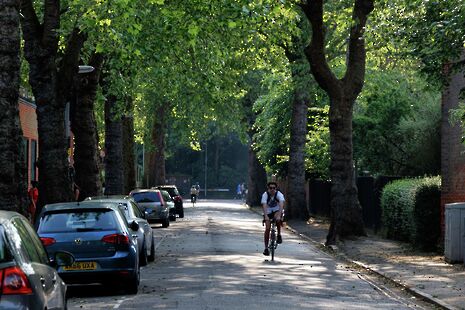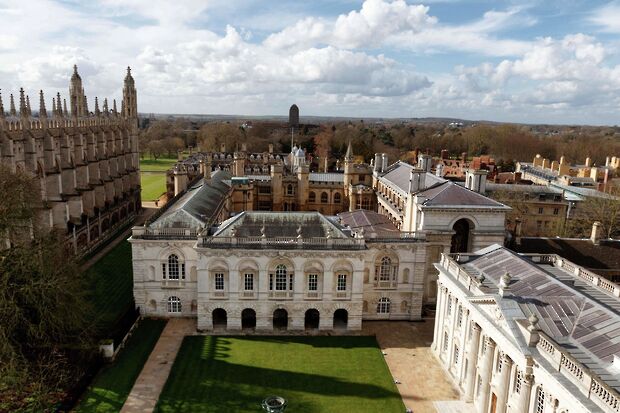University missed several key environmental sustainability targets in 2018
Eight out of thirteen targets were not sufficiently met, according to the University’s third annual Environmental Sustainability Report

The release of the Cambridge’s annual environmental sustainability report last week has revealed that, whilst certain improvements were made, the University missed several key sustainability targets last year.
In 2017-18, out of a total thirteen targets set, five were achieved or the University considers itself to be “making good progress on”, whilst it says it “could do better” to reach the remaining eight goals.
In the report, Vice-Chancellor Stephen Toope said: “we are making good progress in some areas, while in others we clearly need to do more,” stating that the “challenge [of achieving environmental sustainability… is compounded by the University’s multifaceted nature and its continuing growth.”
One area in which progress was not made in 2017-18 was water consumption. The University aims to reduce this by 20% by 2020/21 against its 2005/06 baseline. However, in 2017-18 there was a 24% increase against the previous year, a figure 12% higher than the baseline goal.
Recycling was also an area in which Cambridge failed to meet its own targets. The University had aimed to recycle at least 95% of the total waste it produced by 2016-17, and had been making progress in achieving this goal, reaching 83% in that year. In 2017-18, however, it only managed to recycle at a rate of 67%. The report attributed this to a reduction in the rate of construction waste recycling, although it also points to “challenging national issues with waste management issues”.
Another area in which a clear need for progress was demonstrated was travel and transport. In 2017-18, levels of sustainable travel being regularly used by staff in their commutes were at 70%. This was a reduction from 74% in 2016-17, a figure just shy of the 75% goal set by the University for that year.
A likely cause of this, the report stated, was the relocation of parts of the University estate to outside of the city centre, in addition to “high house prices in Cambridge pushing more staff to live outside of Cambridge in areas with limited sustainable travel options.”
Additionally, the per capita carbon emissions from business flights increased by an estimated 9% in 2017-18. The University aims to reduce such emissions by 25% by 2020/21. A new Transport Working Group was established in the 2017-18 period and the adoption of the new strategy it releases for sustainable commuting options is expected this year.
Targets the University have met include the reduction of carbon emissions. In May 2018 a revised Carbon Reduction Strategy was adopted, which set the overall goal of carbon neutrality by 2050 for the University, although activists have criticised this date as too far away. In 2017-18 the first interim target outlined by this plan was achieved, as emissions were reduced by 6% against 2005/06 levels – although the University was on track to miss its original targets by a wide margin.
Toope stated in the report that the University takes its “deep and long-term commitment to achieve outstanding environmental performance…very seriously.”
A University spokesperson told Varsity that “One of the issues our experts have been working on is how we can bring the University’s target date for carbon neutrality forward by a decade in recognition of the urgency of these issues.”
“The University is also establishing a Centre for a Carbon Neutral Future, to bring together strands of research.”
They added: “Making absolute reductions is challenging for most organisations, and the University is no exception, particularly in view of its continued growth. However, we are moving in the right direction.
“The Environmental Association for Universities and Colleges (EAUC) nationally recognised our commitment to sustainability and the work we have been doing with two Green Gown awards in 2017/18 for sustainability reporting and out work on sustainable food.”
The CUSU Ethical Affairs Campaign criticised the report’s finding, telling Varsity the report showed “a failure of institutional leadership to understand the climate crisis we are currently facing” on the part of the University and slated the changes made by Cambridge as “lacklustre and piecemeal”.
“It is clear that radical change is needed,” it said. “Cambridge is the wealthiest University in Europe. It is the global poor that will suffer the most from their inaction, in particular communities in the global south which are already experiencing the deathly reality of climate breakdown. The University has a duty to marginalised communities worldwide to rapidly decarbonise and make progress on their sustainability targets.”
Cambridge Zero Carbon Society was also critical, stating in a comment to Varsity: “Cambridge have once again failed to act on the climate crisis. It is failing to meet its own targets and failing to listen to the views of its members. The University must commit to carbon neutrality by 2030 and full divestment from fossil fuels.”
 Comment / Plastic pubs: the problem with Cambridge alehouses 5 January 2026
Comment / Plastic pubs: the problem with Cambridge alehouses 5 January 2026 News / Cambridge academics stand out in King’s 2026 Honours List2 January 2026
News / Cambridge academics stand out in King’s 2026 Honours List2 January 2026 News / Cambridge businesses concerned infrastructure delays will hurt growth5 January 2026
News / Cambridge businesses concerned infrastructure delays will hurt growth5 January 2026 News / AstraZeneca sues for £32 million over faulty construction at Cambridge Campus31 December 2025
News / AstraZeneca sues for £32 million over faulty construction at Cambridge Campus31 December 2025 Interviews / You don’t need to peak at Cambridge, says Robin Harding31 December 2025
Interviews / You don’t need to peak at Cambridge, says Robin Harding31 December 2025










